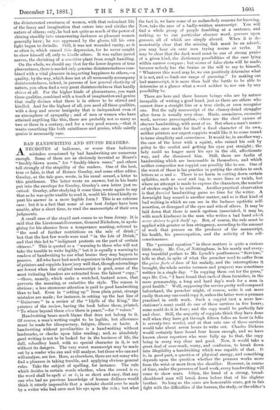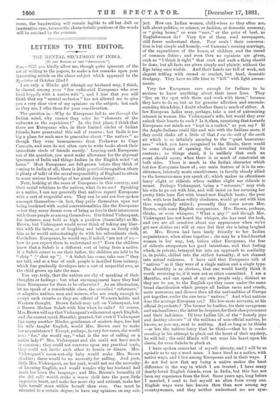BAD HANDWRITING AND STUPID READERS.
ANECDOTES of ludicrous, or worse than ludicrous mistakes occasioned by bad handwriting are numerous enough. Some of them are as obviously invented as Moore's "freshly-blown noses," for " freshly-blown roses," and others tell strongly of the stupidity of the readers. One of the best, true or false, is that of Horace Greeley, and some other editor. Greeley, as the tale goes, wrote, in his usual scrawl, a letter to this gentleman. The latter wrote an answer, but in his haste put into the envelope for Greeley, Greeley's own letter just re- ceived. Greeley, after studying it some time, wrote again to say that as he was quite unable to read it, would his friend kindly re- peat his answer in a more legible form ? This is an extreme case ; but it is a fact that some of our best judges have been unable, after a short time, to read the manuscripts of their own judgments.
A small case of the stupid sort comes to us from Jersey. It is said that the Lieutenant-Governor, General Nicholson, in apolo- gising for his absence from a temperance meeting, referred to " the need of further restrictions on the sale of drink ;" but that the last few words were read " in the Isle of Drink," and that this led to " indignant protests on the part of certain citizens." This is quoted as a " warning to those who will not take the trouble to write legibly," but it is equally a warning to readers of handwriting to use what brains they may happen to possess. All who have had much experience in the performances of printers and copyists know;very well that, though misreadings are fewest when the original manuscript is good, some of the most irritating blunders are extracted from the fairest " copy," —those, namely, which make a wretched, bastard sense, that perverts the meaning, or enfeebles the style. The reason is obvious ; a less strenuous attention is paid to good handwriting than to bad. Even in " setting up " from plain print, strange mistakes are made ; for instance, in setting up the last line of " Guinevere " in a review of the " Idylls of the King," the printers of the review, having the book before them, printed, " To where beyond these vices there is peace,"—for " voices."
Handwriting bears much blame that does not belong to it. Of course, a man's writing ought to be legible, but allowance must be made for idiosyncrasy, fatigue, illness, or haste. A handwriting without peculiarities is a hand writing without landmarks, or checks upon false reading ; and, as absolutely good writing is not to be looked for in the business of life, the dull, schoolboy hand, with no special character in it, is not without its dangers. The very worst manuscript may be made out by a reader who can and will analyse, but those who can and will analyse, are few. Here, as elsewhere, there are not many who find a pleasure in taking trouble, and applying obvious general rules. Take the subject of spelling, for instance. The role which decides in certain words whether, when the sound is ee, the word shall be spelt ei or ie, is so short and easy, that any one who had no previous knowledge of human dullness would think it utterly impossible that a mistake should ever be made by a writer who had once cast his eye upon the rule ; but what the fact is, we have some of us melancholy reasons for knowing. Now, take the case of a badly-written manuscript. You will find a whole group of people fumbling at a sentence, and making, as to one particular obscure word, guesses upon guesses, all of which are simply absurd. When it is de- monstrably clear that the missing link must be an adverb, you may hear six sane men trying nouns or verbs. It may be clear that the dark word must be one of strong praise of a given kind, the dictionary possibilities of the case lying within narrow compass ; but scores of false shots will be made, because nobody has the brains or the will to say to himself, " Whatever this word may be, we can positively determine what it is not, and so limit our range of guessing." In making out bad manuscript, it is more than half the battle to be able to determine at a glance what a word neither is, nor can by any possibility be.
There are here and there human beings who are by nature incapable of writing a good hand, just as there are others who cannot draw a straight line or a true circle, or even recognise one. But the ugly manuscript of the clumsy-fisted struggler after form is usually very clear. Haste, uneasiness, excessive work, nervous preoccupation,—these are the chief causes of obscure handwriting, with most of us. But when a man's manu- script has once made for itself a fixed character of its own, neither printers nor expert copyists would like it to come round to tame simplicity and correctness. It would be, in another way, the case of the lover with a squint, who ruined his suit by going to the oculist and getting his eyes put straight ; the lady could no longer meet his eye in the old, affectionate way, and she dismissed him. Still, there are faults of handwriting which are inexcusable in themselves, and which neither compositor nor copyist can possibly like to see. One of the worst of these is lax practice in putting the strokes to such letters as and a. There is no harm in cutting down certain syllables, such as ment and ing, to mere lines or twirls, but where an attempt is made to express the characters, the number of strokes ought to be uniform. Another practical observation is that flurried handwriting gains no time for the writer. A downright lazy scrawl is another matter, and so is that kind of had writing in which we can see in the badness egotistic self- assertion, or disregard of the eyes and wits of others. It may be laid down that there is much egotism (associated, it may be, with much kindness) in the man who writes a bad hand which never strives to pick itself up. But, of course, the rule must be applied with.greater or less stringency, according to the amount of work that presses on the producer of the manuscript, his health, his preoccupation, and the activity of his self- consciousness.
The "personal equation" in these matters is quite a curious little study. Mr. Cox, of Nottingham, in his manly and every- way beautiful preface to Mr. Lynch's posthumous " Services," tells us that, in spite of what the preacher used to suffer from the peine forte et dare of his malady, and the interruptions it brought, the whole service (sermon and prayers) was sometimes written in a single day. " In copying them out for the press," says Mr. Cox, " I have found that each of them furnishes, in the mere penmanship, a long and hard day's work for a man in good health." Well, supposing the service pretty well composed beforehand, the preacher might, of course, write it out more easily than any one could copy it, unless the latter were a penman practised in swift work. Such a copyist (not a mere law- stationer's man) could do one of these services in five hours ; some could do it in four ; and the copy would be perfectly fair and clear. Still, the majority of copyists think they have done well when they have got through fifteen folios an hour (a folio is seventy-two words), and at that rate one of these services would take about seven hours to write out. Charles Dickens would certainly have found four hours enough, and we have known clever reporters who were fully up to that, the copy being in every way clear and good. Now, it would take a great deal of over-work, worry, and confusion, to break down into illegibility a handwriting which was capable of that. It is, in good part, a question of physical energy, and something depends upon the question whether the penman works more from the wrist or more from the shoulder. However, in course of time, under the pressure of hard work, every handwriting will come to show scars. Often, the hand of a strong, broad- shouldered man will break down before that of his slighter brother. So long as the scars are honourable scars, got in fair fight with the difficulties of the bureau, the study, or the editor's room, the handwriting will remain legible to all but dull or inattentive eyes, because the characteristic portions of the words will be retained by the penman.











































 Previous page
Previous page